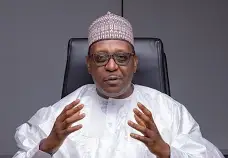The Federal Government has approved a new National Policy on Health Workforce Migration.
Disclosing this on Monday through a post on X, the Minister of Health, Ali Pate, reaffirmed the government’s commitment to tackling the challenges surrounding healthcare human resources in the country.
He said President Bola Tinubu presided over the Federal Executive Council meeting at the Presidential Villa in Abuja, where the policy was approved.
“This policy is more than just a response to the ongoing exodus of healthcare professionals; it’s a comprehensive strategy to manage, harness, and reverse health worker migration,” the minister said.
“It envisions a thriving workforce that is well-supported, adequately rewarded, and optimally utilized to meet the healthcare needs of all Nigerians.”
According to Pate, the goal of the new policy is to encourage the return and reintegration of Nigerian health professionals from the diaspora.
This afternoon, HE President Bola Ahmed Tinubu, GCFR @officialABAT, in-Council, approved a landmark policy set to transform healthcare human resource management in Nigeria.
The National Policy on Health Workforce Migration addresses the critical challenges facing Nigeria’s… pic.twitter.com/RlQwVuN1hW
He said that the policy aims to streamline registration processes and provide incentives to attract skilled professionals back to Nigeria, thereby strengthening the healthcare system.
“By establishing streamlined registration processes and providing attractive incentives, the policy not only encourages the return of our talented professionals but actively reintegrates them into our health system. This approach leverages the expertise of our diaspora to bridge gaps within the health sector.
“Also, the policy champions reciprocal agreements with other nations to ensure that the exchange of health workers benefits Nigeria. These bilateral and multilateral agreements are designed to protect national interests while respecting the rights and aspirations of our healthcare professionals. We call on recipient countries to implement a 1:1 match—training one worker to replace every publicly trained Nigerian worker they receive.
“Recognizing the importance of work-life balance, the policy includes provisions for routine health checks, mental well-being support, and reasonable working hours, especially for younger doctors. These measures aim to create a supportive work environment, reducing burnout and enhancing job satisfaction,” the minister stated.(With Agency Report)



